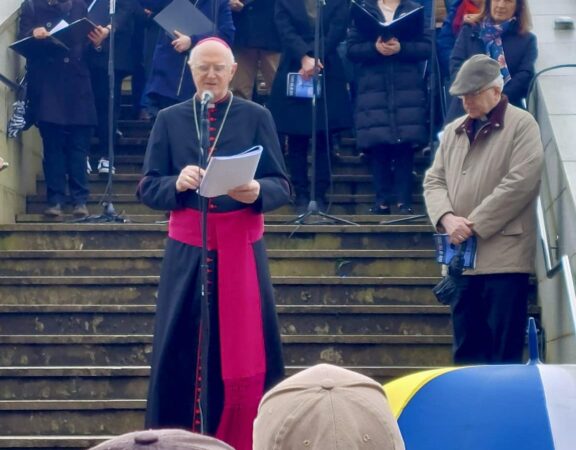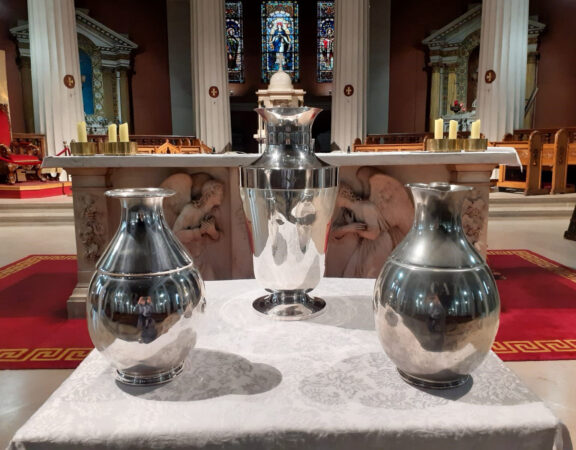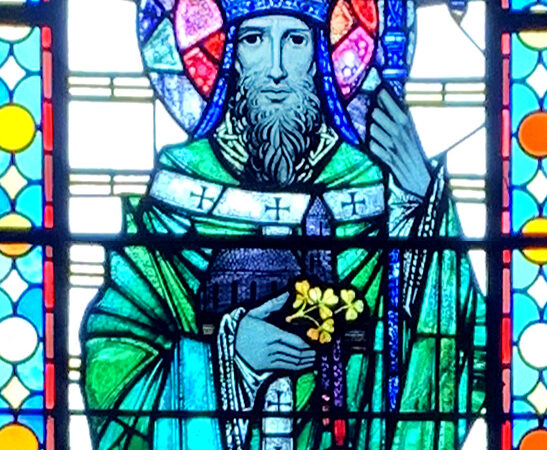FEAST OF SAINT LAURENCE O’TOOLE 2018
Homily notes of Most Rev. Diarmuid Martin Archbishop of Dublin
Pro-Cathedral, 14th November 2018
“We all know about Saint Laurence O’Toole and yet we perhaps we know too little about him. He and Saint Oliver Plunket are the only Irish-born Saints formally canonised. He was canonised only 45 years after his death. That was even for those times a remarkably short time. Interestingly, it was the community of the small town of Eu in northern France where he died and where he is buried who led the cause for his canonisation in a particular way.
He had only spent a few days in Eu before he took ill and died, yet the fame of his holiness took root instantly and many miracles took place in his name. His special holiness led to his canonisation by Pope Honorius III in 1225. Pope Honorius was the Pope who had recognised the reforming work of both Saint Francis of Assisi and Saint Dominick and he was evidently similarly struck by the life of Laurence as a reformer of the Church.
Laurence was in France on a mission of peace hoping to hope to bring an end to the violent conflict that was taking place in Dublin after the Norman invasion. Laurence was always a man of peace. From his childhood onwards, his own family were deeply involved in the turbulent politics of Ireland and he himself was held hostage as a child amid family feuds. However, from childhood on, his real aspiration was to be a priest and a monk. He was a man of deep prayer and that sense of prayer became dominant in all his activities. He became a monk and at a young age Abbot of Glendalough.
He was a reformer of monasteries and of the religious life of the country. He was a man who had developed a knowledge of the reforms and renewal that were taking place in monastic life across Europe and wished to bring the life of this monastery in line with the ongoing reforms.
When he became Archbishop of Dublin at the age of 32, he began a similar reform of the Church. He brought Canons Regular of Saint Augustine Augustinian to his Cathedral in Dublin to make it more evidently a visible place of prayer. He was a reformer of the clergy. He stressed the place of prayer in their life. His ministry could be identified with the words of our Gospel reading this morning: “You must come away to some lonely place all by yourselves and rest for a while; for there were so many comings and goings…”
Today, we Christians need more than ever moments where we step back from the comings and goings of life in our modern world and step into lonely places, in order to find ourselves. We live in a culture where there are so many comings and goings. The opportunities that exist for digression and entertainment and of all sorts of self-interest are so great that we find it hard to find time to be alone.
There is indeed a temptation to think that we become our true selves above all through doing things, and yet end up feeling empty and then try to compensate through doing even more things. Emptiness is indeed one of the factors that leave people without anchor or even without purpose and they then fail to find themselves in their interior value and worth. We all need time to be alone and to pray.
Even among us priests, there are some who can fall foul of the temptation of measuring value through doing things. Social media can today be a very valid and successful way on communicating about faith. They can also lead to a sort of destructive addiction. There are some who seem to feel that the mission of the Church can be enhanced by uninterrupted negative twittering. There is nothing farther from the hope-filled message of the Church than such an addiction of pessimism. We all need time to be alone to reflect and to pray.
Laurence O’Toole was a man of prayer and, despite an extraordinary activity and energy that is genuinely stunning, and despite the harsh difficulties of the time, he always maintained his sense of prayerfulness. It was recognised wherever he went. Prayer is not a flight form the world but something can enrich and bring a different quality to our human interaction with other people.
Laurence was a peacemaker. Dublin was a troubled city in his time and he made every possible effort to restore peace to the city. The Dublin of his time was a city that was beginning to enjoy prosperity, but that prosperity brought neither equality nor peace. That prosperous Dublin was a city of the poor and Laurence himself was known as a friend of the poor, renowned for providing food for the poor even in his own house.
Here again Laurence is an example for the Church and for society in our own times. Dublin is a wealthy city that has not managed to bring equality and caring. President Higgins in his inauguration speech stressed just how much today homelessness and lack of equal access to education and health care deprive people of the very fundamentals needed to realise their basic human aspirations.
Today’s Dublin is also marked by violence. This is something that has left me as Archbishop really troubled over the years. There are various form of violence: we talk of gangland violence, violence against women, domestic violence, political violence or violence among young people. I do not like to categorise violence, as if some violence is somehow more justifiable or acceptable than another. Violence is always violence, it is always a form of total disregard for human dignity. It is always an affirmation that I can to treat another as inferior in order to attain my way. Violence is always despicable.
Over the years, I have become ever more concerned by the growth of knife crime. I am horrified when I hear almost daily stories of stabbings. Young people can begin to feel that carrying a knife can bring security. The reality is often the opposite and so often leads to tragedy. There are also are growing signs of unresolved anger which then affect day-to-day behaviour and discourse and social exchange.
Knife crime among young people requires new and creative forms of community education and anger management. We cannot leave it up to young people alone to build safe communities.
Laurence O’Toole was above all a Churchman. In his role of peacemaker that he was forced to undertake as part of his duty, he always appeared as someone different. He was a political figure in a different way: he was a man who sought to change society through the weapons of his Christian faith: prayer, respect, generosity to the less fortunate, appealing to the higher instinct of human kind, and the courage to take concrete steps to do something.
Laurence was attached in a special way to the See of Peter. He attended the Third Lateran Council. Just imagine in his time what travelling to Rome meant in terms of human efforts and discomfort. He travelled to Rome at a time of difficulty and division in the Christian Church and around the papacy. He realised how important the unity of Christians was and he saw the Pope and the See of Rome as a focal point of the unity of bishops with and around the office of Peter.
When we speak about the unity of Christians we think and rightly so about the unity of separated Churches and faith communities. Today we have to face new forms of negative polarisation within our own Catholic community. In part, this can be due to frustration by lack of authentic transparency within our Church. There is also a sense in which this polarisation is influenced by the same culture of confrontational antagonism that marks and indeed mars our society and leads only to negativity.
Looking back at the history of the Church it is important to remember that the true reformers of the Church, even in the most difficult of circumstances, were those who showed that they loved their church and took up the weapons of love and tolerance to heal and reconcile.
We thank God for the gift of Saint Laurence O’Toole and we call his blessing on all of us who form the Church of Jesus Christ in Dublin today in this twenty first century. ENDS









